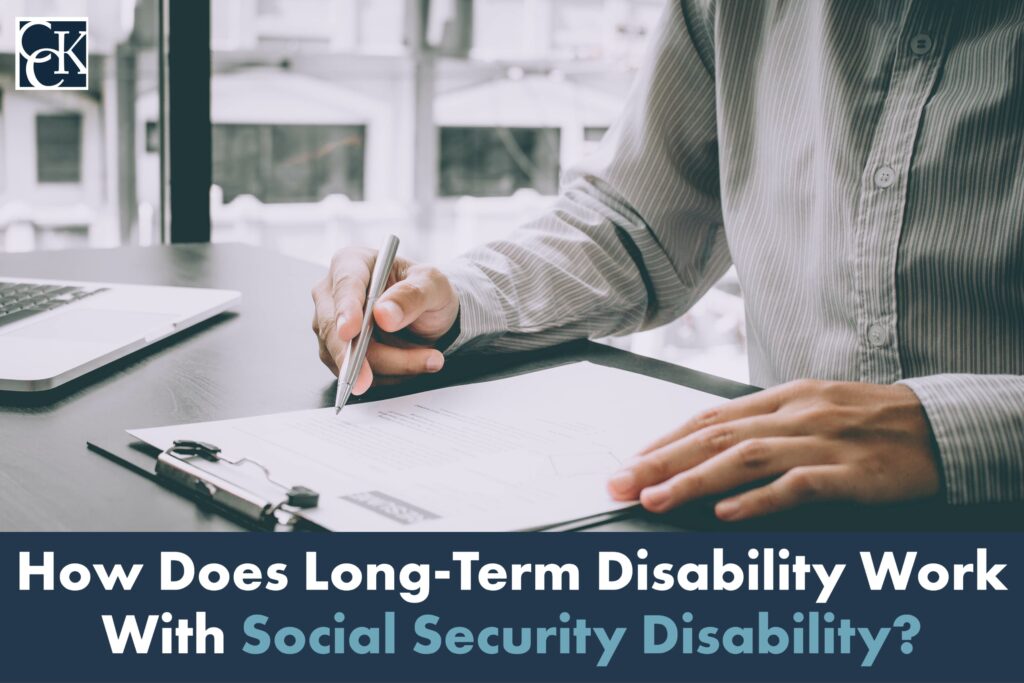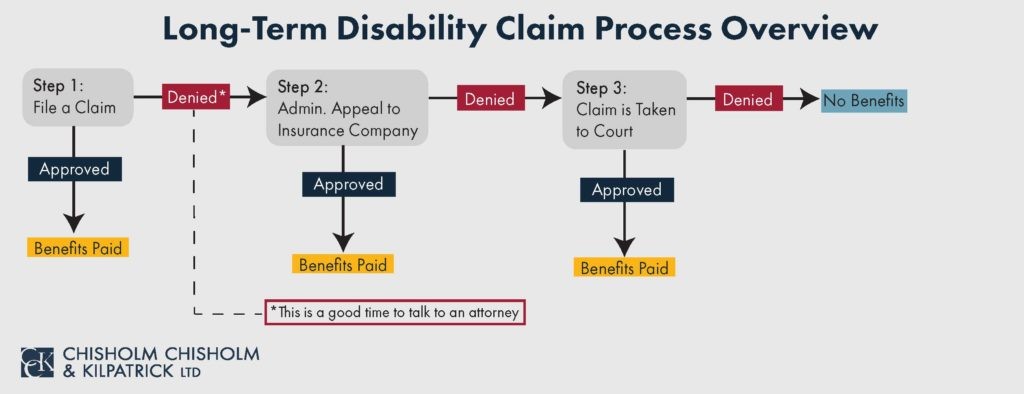How Does Long-Term Disability Work With Social Security Disability?

Insurance companies typically aim to pay less out of their own pocket whenever possible. As a result, most long-term disability (LTD) policies will require you to apply for Social Security Disability Insurance (SSDI) benefits and, if you are approved for SSDI benefits, the insurance company will then look to offset your long-term disability benefits with your Social Security Disability benefits.
For example, suppose you were receiving $1,500 in monthly long-term disability benefits and are approved for $500 in Social Security Disability benefits. In this case, your insurance company will start paying you $1,000 in monthly long-term disability benefits because you are receiving the remainder of your benefit from Social Security Disability. Additionally, the insurance company will often request the documents and medical records that were part of your SSDI claim. Thus, it is important to keep your Social Security Disability application consistent with your long-term disability claim.
In this article, CCK Law will discuss:
- What happens if LTD claimants don’t apply for SSDI
- If insurers can terminate LTD benefits due to SSDI benefits
- Overpayments
- And more
Reduced Long-Term Disability Benefits If You Do Not Apply for Social Security Disability
Many long-term disability policies will require you to go through all available levels of appeal for your SSDI claim. You should read your policy carefully to understand how far you need to take your SSDI application if your initial application is not approved.

The insurance company may offset your future LTD benefits based on your estimated SSDI benefits if you do not adhere to the LTD policy’s SSDI application requirements, either by not applying for SSDI at all or by not pursuing all levels of appeal if your SSDI claim is denied.
The Insurance Company Offered a Company to Assist Me With My SSDI Claim. Should I Use Them?
Insurance companies often offer a vendor company to assist claimants with their SSDI claim. However, these companies likely will not consider the effects your SSDI claim may have on your LTD claim. Additionally, these vendors are contracted to the insurance companies, who are often seeking to pay you less out of their own pocket if possible.
There are many attorneys who are capable of handling SSDI claims and understand how that claim can affect your LTD claim. You can also handle your initial SSDI claim yourself. Either way, you should consider searching for alternative options before agreeing to use the insurance company-supplied vendor.
Can the Insurance Company Use My Social Security Disability Denial to Terminate My Long-Term Disability Benefits?
As mentioned above, the insurance company will often request the documents related to your Social Security Disability claim. Your long-term disability claim could be influenced by the records and decisions in your SSDI file. As a result, your reports to the Social Security Administration should be consistent with your reports to the insurance company.

Social Security Disability and long-term disability typically have different definitions of disability and use different criteria to assess the records on file. As a result, approval for one does not guarantee approval for the other. However, your social security disability claim may bolster your long-term disability claim if you are approved based on the medical conditions that also form the basis of your LTD claim.
Unfortunately, the reverse is also true–the insurance company may argue that you are no longer entitled to long-term disability benefits if your Social Security Disability claim is denied because the Social Security Administration determined that your medical conditions are not disabling. You should consider contacting an attorney if your SSDI claim is denied and you are concerned about it negatively impacting your long-term disability claim.
Overpayments
If your SSDI claim is approved, the insurance company may tell you that you were overpaid if you receive past-due SSDI benefits for a period in which you already received LTD benefits. The insurance company will likely tell you that they should have been offsetting your SSDI benefits during that time, but because they did not, you now owe money back to them. You should hold onto any retroactive Social Security Disability benefits that you receive until you have confirmed any overpayments with the insurance company.
The insurance company may offer alternative repayment options if you are not able to pay the overpayment in full. You may be able to reduce your monthly LTD benefit until your overpayment is repaid. You should read your policy carefully because the insurance company may be allowed to reduce your monthly benefit to the minimum benefit, which is usually around $100 per month, until the overpayment is repaid.
Contact the Long-Term Disability Legal Team at CCK
Managing both a long-term disability and Social Security Disability claim can be overwhelming. At Chisholm Chisholm & Kilpatrick, our team of attorneys and professionals can help ensure that the insurance company is offsetting your SSDI benefits correctly and that your long-term disability claim is not negatively affected by your SSDI claim. If you are concerned about the impact of your SSDI claim on your LTD claim, contact us now at (401) 237-6412 for a free case evaluation.

About the Author
Share this Post
